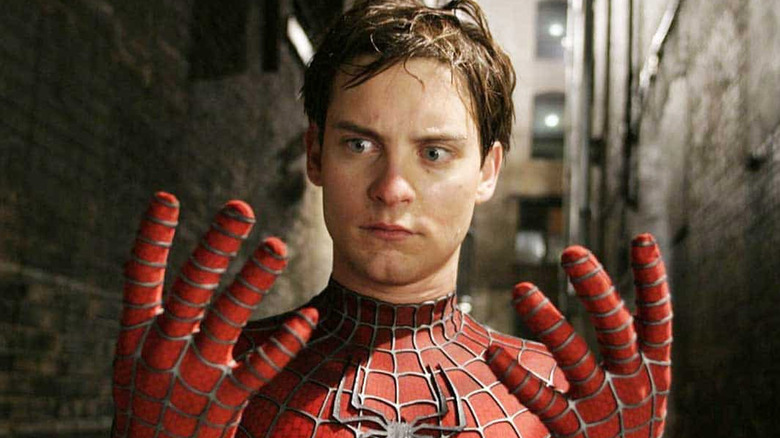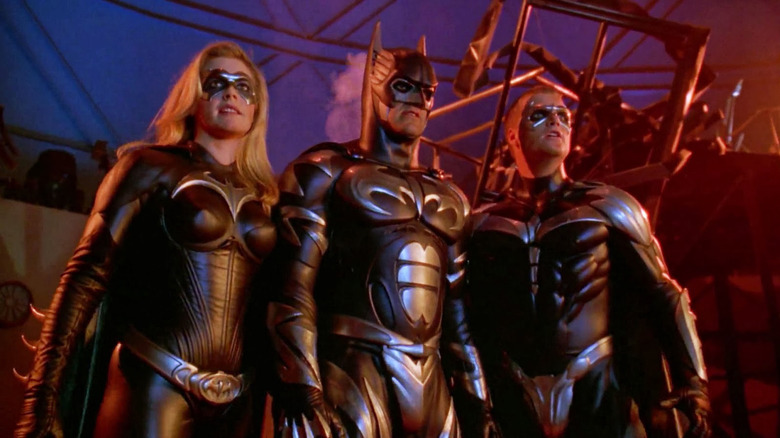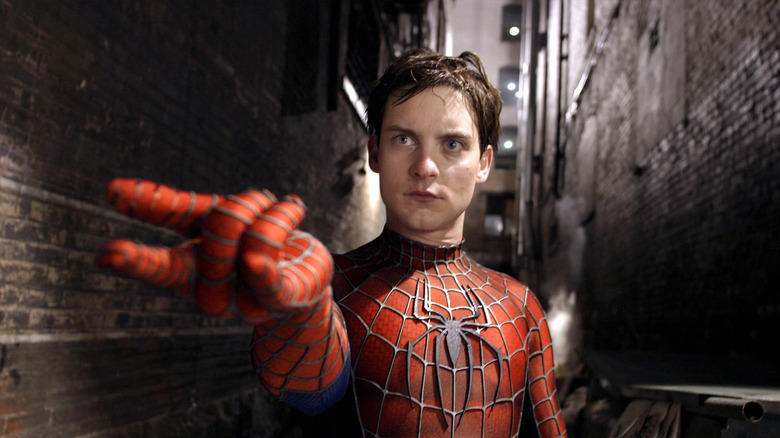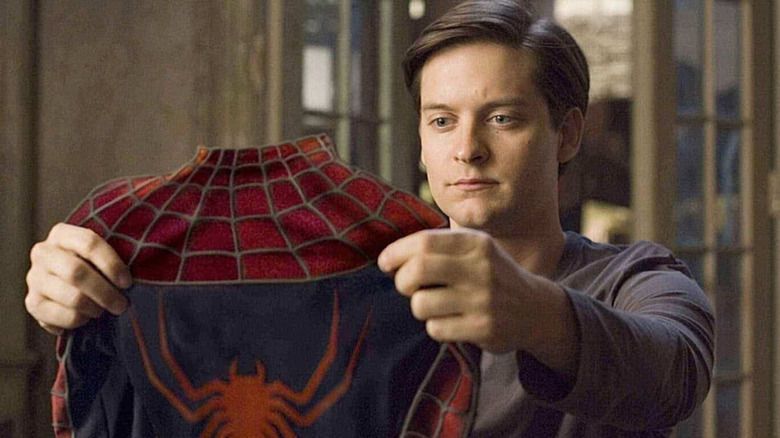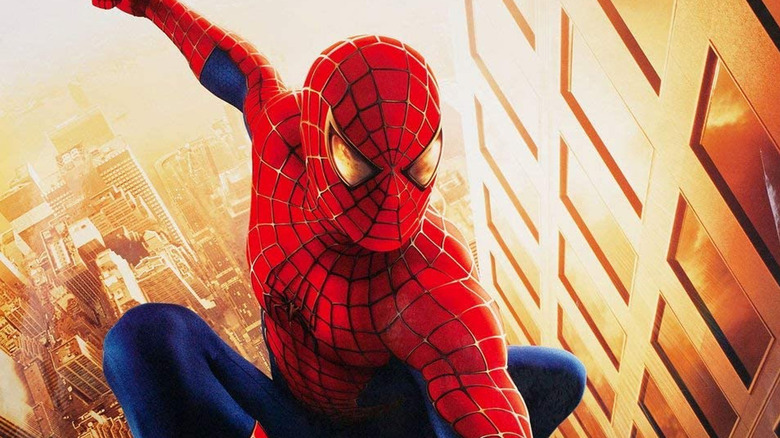Why Almost Every Studio Turned Down The First Spider-Man Movie
It's hard to remember a time when Spider-Man movies didn't dominate the multiplexes. But long before "Spider-Man: No Way Home," and before "The Amazing Spider-Man" movies, Sam Raimi's "Spider-Man" proved the impossible: that Spider-Man could stand on his own in a major Hollywood blockbuster.
It's crazy now to think that this was ever a doubt, but "Spider-Man" wasn't always the sure thing it is now. The 2002 movie cast Tobey Maguire as Peter Parker — the dorky kid from the Marvel comic books who gets bitten by a radioactive spider and gets a bunch of now-iconic superpowers. By now, the origin story has become firmly ingrained in the popular consciousness. There are the wise words of Uncle Ben (Cliff Robertson) — "with great power comes great responsibility" — followed by Uncle Ben's tragic death, which compels Peter to become a friendly neighborhood Spider-Man.
It's a story we've seen countless times since, and now the first movie feels like a lifetime ago. "Spider-Man" predated the Marvel Cinematic Universe by quite a margin ("Iron Man" kicked the MCU off in 2008, by which point Raimi had completed his "Spider-Man" trilogy). Although the first "Spider-Man" movie was released back in 2002, it had actually been in development at various studios since the 1980s. The first "X-Men" film (released in 2000) hadn't seen the light of day when "Spider-Man" was first on the table — and without the precedent of that movie's success, "Spider-Man" was a tough sell.
The Not-So-Golden Age
At first glance, it's easy to see why the studios were reluctant to take a risk with "Spider-Man." Comic book movies were old news, with the dizzy heights of "Superman" and the Tim Burton "Batman" films long behind us. By the late '90s, it had been a long time since we saw a superhero front a big blockbuster, with only 1998's "Blade" in recent memory.
"Spider-Man" screenwriter David Koepp explained what went wrong:
"Superhero movies had fallen on hard times. They weren't making any kind of cultural connection, and there had been a number of ones that were cheap and were considered s***ty."
It's true; the '90s saw a spate of low-quality comic book movies drag the medium through the mud, with the likes of "Batman & Robin" turning critics against the medium. And let's not even talk about the '90s "Fantastic Four" film that was never even (officially) released.
These high-profile failures cemented the nature of comic book movies to most major studios: they were out of touch, cheesy, cliché and made for kids. It wasn't until "Blade" and M. Night Shyamalan's "Unbreakable" that we saw how a modern superhero movie could be different. But unlike those movies, "Spider-Man" likely suffered from its association with brightly-colored spandex costumes.
It was a hard sell for anyone to make a Spider-Man movie that would hold up to scrutiny ... and with a project long in-development from James Cameron, it looked as though "Spider-Man" might never see the light of day.
James Cameron's canceled Spider-Man movie
That's right – James Cameron was once set to make a "Spider-Man" movie. Working with the now-defunct Carolco Pictures, the legendary filmmaker put pen to paper for his own version of Marvel's most recognizable comic book hero. "To me, there were all the superheroes and then there was Spider-Man," he told Collider in 2014.
Unfortunately for Cameron, his "Spider-Man" movie was never actually made. Still, the project lives on in infamy, as his original treatment made its way online and spills all the details on what could have been.
The biggest change? Cameron wanted to push the boundaries of PG-13 with profanity, violence, and even a love scene between Peter Parker and Mary Jane Watson. Much more of a coming-of-age film, Cameron described his Spidey as "your basic sexually pent-up adolescent," with his transformation as an allegory for puberty. There was even a scene with Peter waking up covered in his own web fluid. Not quite the family-friendly Spider-Man of the MCU.
Ultimately, it was the mess of complicated rights issues that scuttled Cameron's "Spider-Man." Back in 1985, Marvel sold the Spider-Man rights to Cannon Films, which eventually shelved its Spider-Man plans in the face of financial ruin. Producer Menahem Golan then sold the Spider-Man rights three ways, with Carolco picking up theatrical distribution.
At this point, Cameron began working on his "Spider-Man" but hit a snag: he was already contracted to exclusively work with 20th Century Fox, and since Fox refused to bid for the Spider-Man project, he was forced to eventually abandon it. And there's a good reason Fox wanted nothing to do with Spider-Man...
Who wants to watch Spider-Man?
It's no secret that "Spider-Man" wasn't a hot property in the late '90s. After all, the studios felt comic book movies were in decline, and the box office failings of "Batman & Robin" didn't exactly help matters.
Earning just $107 million domestic, "Batman & Robin" suffered from a 65% decline in its second week. More importantly, the film cemented the idea that superhero movies were just for kids, rather than being a genre with serious four-quadrant potential.
"You had to get through this perception that comic books were for kids," said former Columbia Pictures exec VP of production Matt Tolmach. "It really was how these things were thought about. Given what you knew it was going to cost, right away it was like, 'Well, how big an audience can we expect for these things?'"
Obviously, "Spider-Man" needed to find an audience, and it wasn't until Sam Raimi's version that anyone took a punt on the superhero property. Former 20th Century Fox executive Sanford Panitch explained who they felt was the core audience:
"Teen boys. That's who you were making Marvel movies for — the small-mindedness of that thinking! Now, they are the most universal genre — they've transcended even adults and teens. They're now just all-audience, family events."
Of course, that wasn't the case originally. Steeped in its comic book roots, the superhero properties were thought to only hold appeal to the younger generations. And that meant most studios wouldn't take a chance on Spider-Man.
Sony swings into action to save the day
After the success of "Blade" it wasn't long before 20th Century Fox moved on "X-Men" ... and then, finally, one major studio took a leap of faith with "Spider-Man." But while Sony eventually got Spidey to the big screen, it some convincing.
"None of the studios had any interest in Spider-Man," said former Marvel Studios president Avi Arad. "You name a studio, they turned it down. They thought, 'That's an old property.' Obviously, I felt this is the biggest property out there. So, we kicked the door down. I told them Spider-Man alone is worth a billion dollars. Little did I know, whoa, I was low."
Finally, in 1998, Sony Pictures bought the Spider-Man film rights for just $7 million, with Marvel retaining 5% of the profits and 50% merchandising. It was a phenomenal deal. "[Other studios] couldn't see an event entertainment that is worth the money to do," said Arad. "I don't think they understood it as a huge movie."
"Spider-Man" itself grossed a staggering $825 million worldwide, making Sony's agreement with Marvel the deal of a lifetime. The franchise has since gone on to dominate the box office, with a massive $2.5 billion from Tobey Maguire's movies alone. The entire "Spider-Man" franchise has earned $7.8 billion to date, not including spin-offs.
Sony's risk paid off in a huge way, and with an entire Spider-Verse on its way (not to mention an incredible rogues' gallery), there's no sign of Spider-Man's appeal waning any time soon.
